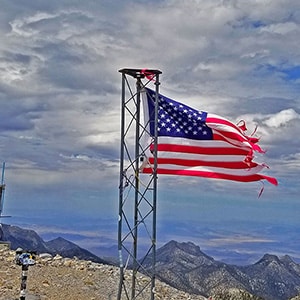Starting in Lee Canyon across from Upper Lee Meadows, ascend the gradual mid-ridge that begins there and connects with the Mt. Charleston North Loop Trail a little over a mile below Lee Peak. Take a right on the North Loop Trail to the final summit approach for Lee Peak summit. Deviate from the North Loop Trail to ascend to the Lee Peak Summit, then descend again to the North Loop Trail. Continue on the North Loop Trail to Charleston Peak summit. Take the Mt. Charleston South Loop Trail from Charleston Peak summit to the junction below Griffith Peak summit. Descend to the South Loop Trail and descend to the South Loop Trailhead just above Charleston Village. From there take a mountain bike stashed earlier at that trailhead and return to Upper Lee Meadows via Deer Creek Road and Lee Canyon Road.
A 5th great reason for taking this adventure route is the spectacular views you’ll see along the way. Here is a short list you will see from multiple awesome perspectives:
Definitely July to early August when the days are longest giving you more light, the snows have melted and yet the terrain at these altitudes (between 8,000 – 11,919ft) remains relatively cool.
The main reason I’m giving conditioning guidelines here is that you enjoy your adventure and the spectacular views along the way vs. being uncomfortably exhausted and possibly worrying how you are going to get back home! It’s the difference between enjoying yourself totally immersed in nature for a day of wonder vs. torturing yourself and wishing you had not attempted this.
This route is NOT recommended unless you have a long standing base conditioning of 4×5-miles/week running plus 1 day 15 miles endurance adventure = about 35 miles/week. Be altitude conditioned up to 11,500ft. In addition, have wilderness navigation skills, ability to traverse long steep loose rock avalanche slopes and familiarity riding a mountain bike along steep mountain highways with many curves. Have a well-maintained mountain bike with night lighting and a reflective vest.
It’s also recommended to have previously accomplished each of the main sections of this adventure before combining them all into one adventure.
On the other hand, if you’ve done the 4-Peak Circuit Adventure the Lee Canyon Mid-Ridge you’re ready for this adventure.
Take Hwy 95 North from Las Vegas. Turn left onto Lee Canyon Road (Hwy 156). Continue on Lee Canyon Road about 16 miles. You’ll continue on Lee Canyon Road past the intersection with Deer Creek Road. Park across from the Lee Canyon Meadow where there is a long paved parking strip.
We’ll break this adventure down into 7 phases:
The mid-ridge takes you from Upper Lee Meadows at the base of Lee Canyon to the connection with the Mt. Charleston Upper North Loop Trail on the upper rim of Lee/Kyle Canyon.
On this, my 3rd ascent of the Lee Canyon Mid-Ridge, that route is well refined and streamlined. This approximately 3-4 mile stretch which ascends about 3,000ft is pure wilderness with no trails. However, it is pretty straight forward: Stay as close to the center of the ridge as you can and follow the guidelines below and you will remain on course throughout. The entire mid-ridge by the course I’m describing is an easy class 2 ascent and descent (meaning no hands needed). However, there are some cliffs and rocky bluffs one could encounter with dangerous off-course consequences.
The mid-ridge can be divided into 2 equal parts: The Lower Mid-Ridge and the Upper Mid-Ridge, separated by a feature I will call “The Gully Gap” in the cliff line.
Lower Lee Canyon Mid-Ridge
The Lee Canyon Mid-Ridge begins about a quarter mile from the parking area on the East (left) side of Lee Canyon Road. Ascend the brief but steep avalanche slope immediately above the parking area to arrive on a wide open forested area with a gradual incline. Angle upward and a bit to the left to quickly find an old abandoned unpaved road that will take you up to a large green water reservoir, which is the beginning of the Lee Canyon Mid-Ridge, just to the left (East) of the reservoir.
The key during the lower half of the Lee Canyon Mid-Ridge is to skirt all rocky obstacles (bluffs, cliffs) to the right (West) while remaining as close to the middle of the ridge as possible. From the water reservoir begin ascending the center of the mid-ridge. Disregard the faint trail that ascends the West side a little below the center because this will later cause you to ascend a steep avalanche slope to regain the center of the ridge.
In the beginning you’re on the very center of the mid-ridge. The ascent is at first rather steep, but after 2-300ft of ascent the angle of ascent will decrease somewhat. The views on the center of the mid-ridge are incredible. To the East (left) is the Foxtail Canyon area with Mummy Mountain and the Lee/Kyle Canyon upper rim as a backdrop. To the right (West) is the base of Lee Canyon (ski area, Bristlecone Pine Trailhead) with a backdrop of the Sisters South, North and Black Rock Sister; Macks Peak and McFarland Peak.
You’ll encounter some rocky bluffs and cliffs on the lower half of the Lee Canyon Mid-Ridge. Skirt them to the right (West) as high as possible without any climbing above class 2. And always return to the center of the ridge as soon as you are able after skirting the obstacles. Eventually you will reach a large obstacle, a cliff line about 50 yards long. Hug the base of this cliff line where there is a narrow pathway between the cliff to your left and the steep avalanche slopes to your right. There is no dangerous exposure here.
Half-Way Gully Gap
After about 50 yards along the base of the cliff you will see an obvious break in the cliff line to your left. This is what I call “The Gully Gap” which allows you to again ascend to the middle of the mid-ridge. There is a brief little 3ft class 3 ledge, but otherwise the Gully Gap is pretty easy, though steep. Incidentally, if you turned right and descended the Gully Gap you would land at the summit of the Lee Canyon Eastern ski run just above the ski lift which is in operation year-round.
But you’re angling up (left) through the Gully Gap back to the center of the mid-ridge. Once back on the center you’re in a beautiful, wide Bristlecone Pine forested area for the next quarter mile of so. This is a good rest point.
Upper Lee Canyon Mid-Ridge
Eventually you will reach another area of cliffs and bluffs. You are now on the upper mid-ridge. The strategy here is to locate a very faint trail that begins to the left (East) about 30ft below the bluffs and cliffs and continues to ascend the ridge eventually dropping nearly 200ft below the center of the ridge. Try to stay on this faint trail, though I guarantee you will loose it a few times along the way.
Just below the summit of the mid-ridge where it connects with the Mt. Charleston Upper North Loop Trail the rocky surface gives way to a soil surface. Here you begin to angle to the right and upward toward the horizon which is the summit of the mid-ridge. The 2-300ft ascent here is so steep (about 18 inches per step!) that I refer to it as “The Ladder”. The soil surface is stable and there is no meaningful exposure, but boy is it steep! At the top of “The Ladder” the Mt. Charleston Upper North Loop Trail will suddenly appear and you’re only a mile or so below Lee Peak summit!
Most of this phase is pretty straight forward. Take a right onto the Mt. Charleston Upper North Loop Trail and head a mile or so toward the base of Lee Peak. The trail begins with a gradual ascent. Eventually the ascent winds sharply upward then again levels off a bit. There are 4 plateau viewpoints. At the 4th plateau viewpoint angle to the right off the trail and up a ridge that will take you about a quarter mile to the summit of Lee Peak. There’s a summit box there that reassures you that you are indeed on Lee Peak summit, though it’s obvious you cannot ascend any higher. Enjoy the views of both Lee and Kyle Canyons and the valleys and mountains beyond!
Now, with Charleston Peak as your reference, descend from Lee Peak Summit via a ridgeline to your right. You can almost see from Lee Peak Summit where that ridgeline reconnects with the Mt. Charleston Upper North Loop Trail. Stay high on the ridgeline with a sharp drop-off just to your right. This ridge line will land you on the Mt. Charleston Upper North Loop Trail about a quarter mile above the point where you left that trail earlier on the way to Lee Peak summit.
Once you arrive on the Mt. Charleston North Loop Trail, you’re remain on that trail up to the summit of Charleston Peak so no navigation instructions are needed. But notice that along this stretch, until the final ascent to Charleston Peak, you will be passing through the most beautiful ancient bristlecone pine forest in the Mt. Charleston Wilderness. Look back often as the ancient sculptured trees look entirely different in either direction along the trail.
That last 5-600ft ascent to the summit of Charleston Peak is a few pretty long switchbacks, but not near as steep as “The Ladder” near the top of the Lee Canyon Mid-Ridge.
During the initial part of the descent from Charleston Peak you are again off-trail, remaining as close to the upper edge of the South Rim of Kyle Canyon as possible. The South Loop Trail will be to your right and below. This is easy class 2 navigation and your right way-point is the historic November 17th, 1955 USAF C-54M Skymaster airplane crash site. Pass through the crash site and continue along the upper edge of the South Rim of Kyle Canyon. In less than a quarter mile you will encounter a trail that angles a bit to the right just below the ridgeline summit toward a high saddle and connection with the Mt. Charleston South Loop Trail. The South Loop Trail will be below and to your right.
Why the ridgeline as opposed to remaining on the South Loop Trail? The ridgeline has a much better view (Entire Kyle Canyon to your left, Pahrump Valley to your right), does not require descent and re-ascent and has a very stable surface, more stable than the South Loop Trail.
The ridgeline trail will reconnect with the Mt. Charleston South Loop Trail just below a saddle ridge. As you top the saddle ridge Griffith Peak and the burn area between you and that peak come into view. Stay on the South Loop Trail through the burn area and all the way to the junction below the summit of Griffith Peak. Note that on the saddle, you’re just a little over 8 miles to the South Loop Trailhead (9 miles if you add in the out-and-back digression from the junction to Griffith Peak summit.
From the junction you can take a one-mile relatively easy out and back digression to Griffith Peak summit. Running out of time and energy, and with many miles to go before returning to Upper Lee Meadow I skipped that digression on this day. But Griffith Peak is truly beautiful and is my second favorite Kyle Canyon peak after Mummy Mountain due to the forested beauty and the views including an incredible view of the Las Vegas Valley and Strip.
This stretch is straight forward descending rather dramatically a little over 4 miles and about 3,000ft to the South Loop Trailhead. The views aren’t as spectacular as on the upper rims above, but the forest is incredible as it descends through a number of climate and plant zones from bristlecone pine forests on and below the canyon rim to the mixed forests below at the trailhead. There are, in addition, at least 4 spectacular overlook viewpoints along the way where you can see across Kyle Canyon and straight down into Charleston Village.
I had earlier stashed my mountain bike at the South Loop Trailhead for the approximate 16-mile return to Upper Lee Meadows. The route began with a descent down Kyle Canyon Road, then a left onto Deer Creek Road, ascent about 5 miles to a high point at the North Loop Trailhead, descent to Lee Canyon Road and final 3-mile ascent up Lee Canyon Road back to Upper Lee Meadows. That WAS the plan. However, things did not go so smoothly.
I was prepared for most anything regarding my mountain bike maintenance. However, one totally unexpected thing happened. Just beyond the junction of Kyle Canyon Road and Deer Creek Road my rigged, double spring-loaded, gravel ready mountain bike seat fell off! And I did not have the proper Allen wrench to re-tighten that fitting! I had wrenches for every other conceivable fitting on the bike, but who could guess the seat would fall off!!
So, I walked the first couple miles toward the North Loop Trailhead high point until a good Samaritan, Charlie, a seasoned mountain biker equipped with every possible wrench size tightened the seat and hauled my bike and I the remaining 3 miles to the North Loop Trailhead summit area where I remounted the bike, descended Deer Creek Road to Lee Canyon Road and then ascended to today’s starting point at Upper Lee Meadow. Other than that blessed, much appreciated 3-mile lift I made the entire approximately 35-mile loop adventure on my own power in daylight, arriving at Upper Lee Meadow with just enough of the waning sunlight to re-attach my bike to the car (“The Beast”) and head back home.
What a spectacular adventure and total day-long immersion in nature from wild wilderness areas to 2 major mountain peaks in Southern Nevada and views stretching as far as the eye could see in all directions–in places seemingly to the curvature of the earth on the horizon!



Return often to experience one new adventure each week! From the home page scroll to “Most Recent Adventures“. More about David Smith…
The trail adventures on this website require proper conditioning, preparation and safety precautions. There are many factors beyond our control including weather conditions, unstable ground, loose rocks, insects and snakes, people you may encounter, your own level of physical conditioning, the potential of getting lost just to mention a few. While this site offers guidance, helpful tips, direction and training, the reader assumes full responsibility for whatever may occur during their trail adventure. Have fun and be safe!